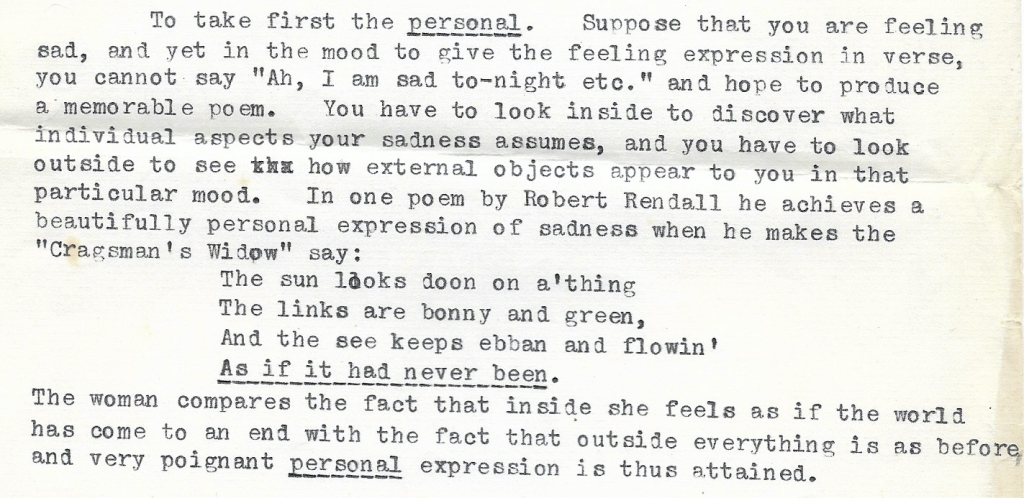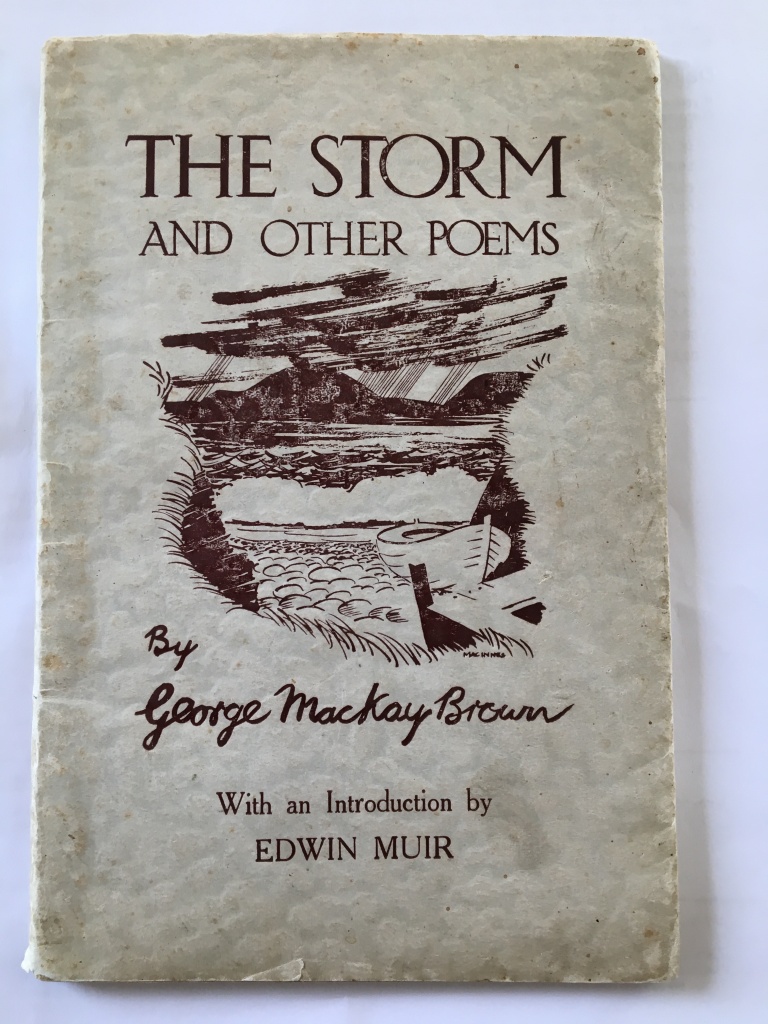Elizabeth Copp
Three months ago I discovered, to my astonishment, a copy of The Storm and Other Poems by George Mackay Brown in my bookcase. I had no idea it was there. I wondered if it had belonged to my dad, as he wrote poetry and was a book lover, but then, after careful consideration, I decided that my late husband Andy had bought The Storm in a second-hand bookshop. Excited by my find, I wrote a story about my discovery for the Scottish Book Trust’s annual writing project, which this year was on the theme of Celebration.
Now, after finding a typed, unsigned letter in among my dad’s poems, I am no longer so sure of my copy’s provenance.
My dad, John Cumming Sclater, was born in 1921, 2 months before GMB. After training in Radiotelegraphy he joined the Merchant Navy in 1941, sailing in convoys to India, South Africa and Egypt. While on board ship, he wrote poetry and continued to do so after he was invalided out of the Navy in 1944. He came home to Kirkwall to work in the family business, managing the production of Norsaga Tweed, and continuing to write as a hobby.
He would write at the kitchen table with the door closed, but I could still hear the keys of his typewriter clacking away at speed. He used to say that his brain worked faster than his fingers, which is why he preferred to type rather than write. Probably, too, his training as a Morse Code operator led to this preference for typing over writing with a pencil.

Until I found this letter in among his poems, I hadn’t realised that he had asked someone local to read and critique his poetry. John wanted to improve his writing, for, as well as being a businessman, he was very creative. Writing was important to him.
“I think you have two of the qualities essential to the writer of verse – feeling and perception”, wrote the anonymous critic. “Your poems, which strike me as being very much better than most occasional verse… give evidence of deep, genuine feeling.”

The writer went on to refer to GMB’s The Storm, suggesting that John went over a poem after writing it and “replacing the obvious, hard-worked adjective with the fresh, concrete shining one. For instance (here I am taking examples from George Brown’s book THE STORM)
Pearl-blind eye Lyrical nests Summer’s sultry throat Mellow bells The tremulous fold (surely a wonderful description in one word of a frightened, bleating huddle of sheep).”
More suggestions from The Storm followed. The writer compared prose with poetry, referring to GMB’s poem ‘Gregory Hero’.
“PROSE MAKES ITS STATEMENTS DIRECTLY – POETRY MAKES ITS STATEMENTS SYMBOLICALLY, AND BY THE USE OF IMAGES. To stick to G.M.B., as you no doubt have his book, he wanted to say (Gregory Hero) that all substances are in essence the same, that the wonderful chemistry of nature is constantly converting matter into fresh forms, that nothing is essentially ugly or essentially beautiful (for the grain grows from the dung-heap, is eaten and reconverted into ordure). If he were writing prose, he would say it somewhat like that, but to give the idea poetical expression he takes a drowned sailor, whose dead body he describes in telling images, then shows, again by vivid symbols, how that body is synthetized and how it disintegrates, yet how in its disintegration it becomes completely identified with all things:
Virgin girls, stretching your hands and breasts
To catch the sun and sweet showers,
Threshing corn and on the hillside
Feeling the wind caress your knees
It is Gregory pursues you round the world.
I wish I knew who had written this crit for my dad. It must be by someone scholarly who has analysed GMB’s poems and knows them well. I had wondered if it might be Ernest Marwick, for he was well known and respected. However, it could equally have been written by an English teacher at Kirkwall Grammar School or a member of the Toastmasters in Kirkwall, for my dad was a member. There were, no doubt, many men in Toastmasters who knew a lot about literature. The interesting bit for me, however, is that the writer assumed that my dad owned a copy of The Storm – “as you no doubt have his book”, he wrote.
I am pleased to have found a connection through The Storm between my dad and George, both centenarians this year. Yet where my copy came from remains a mystery. Did it belong to my dad or my husband? I hope that George might be happy for me to leave the answer up to my imagination.
And thanks to my surprise find, I’ve discovered my writer’s voice. I’m writing stories again. Maybe that’s enough.

I so enjoyed reading this, Elizabeth. It would have been so lovely to know your Dad NOW. I wonder what he would make of our dialect writing. Glad you are wiriting again too. Barbara x
LikeLike
Thank you, Barbara. I’m looking forward to reading your book that’s coming out soon. X
LikeLike
Lovely little read over morning coffee in soft September sunshine.
LikeLike
Thank you, Jane. ‘Soft September sunshine’ is a lovely expression.
LikeLike